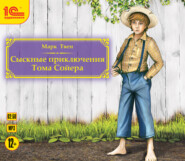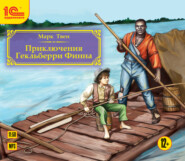По всем вопросам обращайтесь на: info@litportal.ru
(©) 2003-2025.
✖
A Tramp Abroad
Автор
Год написания книги
2015
Настройки чтения
Размер шрифта
Высота строк
Поля
“Why, man, they can’t help that.”
“They? You’re right. That is, they won’t. They could if they wanted to. You never see a speck of dirt on a Protestant glacier. Look at the Rhone glacier. It is fifteen miles long, and seven hundred feet thick. If this was a Protestant glacier you wouldn’t see it looking like this, I can tell you.”
“That is nonsense. What would they do with it?”
“They would whitewash it. They always do.”
I did not believe a word of this, but rather than have trouble I let it go; for it is a waste of breath to argue with a bigot. I even doubted if the Rhone glacier was in a Protestant canton; but I did not know, so I could not make anything by contradicting a man who would probably put me down at once with manufactured evidence.
About nine miles from St. Nicholas we crossed a bridge over the raging torrent of the Visp, and came to a log strip of flimsy fencing which was pretending to secure people from tumbling over a perpendicular wall forty feet high and into the river. Three children were approaching; one of them, a little girl, about eight years old, was running; when pretty close to us she stumbled and fell, and her feet shot under the rail of the fence and for a moment projected over the stream. It gave us a sharp shock, for we thought she was gone, sure, for the ground slanted steeply, and to save herself seemed a sheer impossibility; but she managed to scramble up, and ran by us laughing.
We went forward and examined the place and saw the long tracks which her feet had made in the dirt when they darted over the verge. If she had finished her trip she would have struck some big rocks in the edge of the water, and then the torrent would have snatched her downstream among the half-covered boulders and she would have been pounded to pulp in two minutes. We had come exceedingly near witnessing her death.
And now Harris’s contrary nature and inborn selfishness were strikingly manifested. He has no spirit of self-denial. He began straight off, and continued for an hour, to express his gratitude that the child was not destroyed. I never saw such a man. That was the kind of person he was; just so he was gratified, he never cared anything about anybody else. I had noticed that trait in him, over and over again. Often, of course, it was mere heedlessness, mere want of reflection. Doubtless this may have been the case in most instances, but it was not the less hard to bar on that account – and after all, its bottom, its groundwork, was selfishness. There is no avoiding that conclusion. In the instance under consideration, I did think the indecency of running on in that way might occur to him; but no, the child was saved and he was glad, that was sufficient – he cared not a straw for my feelings, or my loss of such a literary plum, snatched from my very mouth at the instant it was ready to drop into it. His selfishness was sufficient to place his own gratification in being spared suffering clear before all concern for me, his friend. Apparently, he did not once reflect upon the valuable details which would have fallen like a windfall to me: fishing the child out – witnessing the surprise of the family and the stir the thing would have made among the peasants – then a Swiss funeral – then the roadside monument, to be paid for by us and have our names mentioned in it. And we should have gone into Baedeker and been immortal. I was silent. I was too much hurt to complain. If he could act so, and be so heedless and so frivolous at such a time, and actually seem to glory in it, after all I had done for him, I would have cut my hand off before I would let him see that I was wounded.
We were approaching Zermatt; consequently, we were approaching the renowned Matterhorn. A month before, this mountain had been only a name to us, but latterly we had been moving through a steadily thickening double row of pictures of it, done in oil, water, chromo, wood, steel, copper, crayon, and photography, and so it had at length become a shape to us – and a very distinct, decided, and familiar one, too. We were expecting to recognize that mountain whenever or wherever we should run across it. We were not deceived. The monarch was far away when we first saw him, but there was no such thing as mistaking him. He has the rare peculiarity of standing by himself; he is peculiarly steep, too, and is also most oddly shaped. He towers into the sky like a colossal wedge, with the upper third of its blade bent a little to the left. The broad base of this monster wedge is planted upon a grand glacier-paved Alpine platform whose elevation is ten thousand feet above sea-level; as the wedge itself is some five thousand feet high, it follows that its apex is about fifteen thousand feet above sea-level. So the whole bulk of this stately piece of rock, this sky-cleaving monolith, is above the line of eternal snow. Yet while all its giant neighbors have the look of being built of solid snow, from their waists up, the Matterhorn stands black and naked and forbidding, the year round, or merely powdered or streaked with white in places, for its sides are so steep that the snow cannot stay there. Its strange form, its august isolation, and its majestic unkinship with its own kind, make it – so to speak – the Napoleon of the mountain world. “Grand, gloomy, and peculiar,” is a phrase which fits it as aptly as it fitted the great captain.
Think of a monument a mile high, standing on a pedestal two miles high! This is what the Matterhorn is – a monument. Its office, henceforth, for all time, will be to keep watch and ward over the secret resting-place of the young Lord Douglas, who, in 1865, was precipitated from the summit over a precipice four thousand feet high, and never seen again. No man ever had such a monument as this before; the most imposing of the world’s other monuments are but atoms compared to it; and they will perish, and their places will pass from memory, but this will remain.[12 - The accident which cost Lord Douglas his life (see Chapter xii) also cost the lives of three other men. These three fell four-fifths of a mile, and their bodies were afterward found, lying side by side, upon a glacier, whence they were borne to Zermatt and buried in the churchyard.The remains of Lord Douglas have never been found. The secret of his sepulture, like that of Moses, must remain a mystery always.]
A walk from St. Nicholas to Zermatt is a wonderful experience. Nature is built on a stupendous plan in that region. One marches continually between walls that are piled into the skies, with their upper heights broken into a confusion of sublime shapes that gleam white and cold against the background of blue; and here and there one sees a big glacier displaying its grandeurs on the top of a precipice, or a graceful cascade leaping and flashing down the green declivities. There is nothing tame, or cheap, or trivial – it is all magnificent. That short valley is a picture-gallery of a notable kind, for it contains no mediocrities; from end to end the Creator has hung it with His masterpieces.
We made Zermatt at three in the afternoon, nine hours out from St. Nicholas. Distance, by guide-book, twelve miles; by pedometer seventy-two. We were in the heart and home of the mountain-climbers, now, as all visible things testified. The snow-peaks did not hold themselves aloof, in aristocratic reserve; they nestled close around, in a friendly, sociable way; guides, with the ropes and axes and other implements of their fearful calling slung about their persons, roosted in a long line upon a stone wall in front of the hotel, and waited for customers; sun-burnt climbers, in mountaineering costume, and followed by their guides and porters, arrived from time to time, from breakneck expeditions among the peaks and glaciers of the High Alps; male and female tourists, on mules, filed by, in a continuous procession, hotelward bound from wild adventures which would grow in grandeur every time they were described at the English or American fireside, and at last outgrow the possible itself.
We were not dreaming; this was not a make-believe home of the Alp-climber, created by our heated imaginations; no, for here was Mr. Girdlestone himself, the famous Englishman who hunts his way to the most formidable Alpine summits without a guide. I was not equal to imagining a Girdlestone; it was all I could do to even realize him, while looking straight at him at short range. I would rather face whole Hyde Parks of artillery than the ghastly forms of death which he has faced among the peaks and precipices of the mountains. There is probably no pleasure equal to the pleasure of climbing a dangerous Alp; but it is a pleasure which is confined strictly to people who can find pleasure in it. I have not jumped to this conclusion; I have traveled to it per gravel-train, so to speak. I have thought the thing all out, and am quite sure I am right. A born climber’s appetite for climbing is hard to satisfy; when it comes upon him he is like a starving man with a feast before him; he may have other business on hand, but it must wait. Mr. Girdlestone had had his usual summer holiday in the Alps, and had spent it in his usual way, hunting for unique chances to break his neck; his vacation was over, and his luggage packed for England, but all of a sudden a hunger had come upon him to climb the tremendous Weisshorn once more, for he had heard of a new and utterly impossible route up it. His baggage was unpacked at once, and now he and a friend, laden with knapsacks, ice-axes, coils of rope, and canteens of milk, were just setting out. They would spend the night high up among the snows, somewhere, and get up at two in the morning and finish the enterprise. I had a strong desire to go with them, but forced it down – a feat which Mr. Girdlestone, with all his fortitude, could not do.
Even ladies catch the climbing mania, and are unable to throw it off. A famous climber, of that sex, had attempted the Weisshorn a few days before our arrival, and she and her guides had lost their way in a snow-storm high up among the peaks and glaciers and been forced to wander around a good while before they could find a way down. When this lady reached the bottom, she had been on her feet twenty-three hours!
Our guides, hired on the Gemmi, were already at Zermatt when we reached there. So there was nothing to interfere with our getting up an adventure whenever we should choose the time and the object. I resolved to devote my first evening in Zermatt to studying up the subject of Alpine climbing, by way of preparation.
I read several books, and here are some of the things I found out. One’s shoes must be strong and heavy, and have pointed hobnails in them. The alpen-stock must be of the best wood, for if it should break, loss of life might be the result. One should carry an ax, to cut steps in the ice with, on the great heights. There must be a ladder, for there are steep bits of rock which can be surmounted with this instrument – or this utensil – but could not be surmounted without it; such an obstruction has compelled the tourist to waste hours hunting another route, when a ladder would have saved him all trouble. One must have from one hundred and fifty to five hundred feet of strong rope, to be used in lowering the party down steep declivities which are too steep and smooth to be traversed in any other way. One must have a steel hook, on another rope – a very useful thing; for when one is ascending and comes to a low bluff which is yet too high for the ladder, he swings this rope aloft like a lasso, the hook catches at the top of the bluff, and then the tourist climbs the rope, hand over hand – being always particular to try and forget that if the hook gives way he will never stop falling till he arrives in some part of Switzerland where they are not expecting him. Another important thing – there must be a rope to tie the whole party together with, so that if one falls from a mountain or down a bottomless chasm in a glacier, the others may brace back on the rope and save him. One must have a silk veil, to protect his face from snow, sleet, hail and gale, and colored goggles to protect his eyes from that dangerous enemy, snow-blindness. Finally, there must be some porters, to carry provisions, wine and scientific instruments, and also blanket bags for the party to sleep in.
I closed my readings with a fearful adventure which Mr. Whymper once had on the Matterhorn when he was prowling around alone, five thousand feet above the town of Breil. He was edging his way gingerly around the corner of a precipice where the upper edge of a sharp declivity of ice-glazed snow joined it. This declivity swept down a couple of hundred feet, into a gully which curved around and ended at a precipice eight hundred feet high, overlooking a glacier. His foot slipped, and he fell.
He says:
“My knapsack brought my head down first, and I pitched into some rocks about a dozen feet below; they caught something, and tumbled me off the edge, head over heels, into the gully; the baton was dashed from my hands, and I whirled downward in a series of bounds, each longer than the last; now over ice, now into rocks, striking my head four or five times, each time with increased force. The last bound sent me spinning through the air in a leap of fifty or sixty feet, from one side of the gully to the other, and I struck the rocks, luckily, with the whole of my left side. They caught my clothes for a moment, and I fell back on to the snow with motion arrested. My head fortunately came the right side up, and a few frantic catches brought me to a halt, in the neck of the gully and on the verge of the precipice. Baton, hat, and veil skimmed by and disappeared, and the crash of the rocks – which I had started – as they fell on to the glacier, told how narrow had been the escape from utter destruction. As it was, I fell nearly two hundred feet in seven or eight bounds. Ten feet more would have taken me in one gigantic leap of eight hundred feet on to the glacier below.
“The situation was sufficiently serious. The rocks could not be let go for a moment, and the blood was spurting out of more than twenty cuts. The most serious ones were in the head, and I vainly tried to close them with one hand, while holding on with the other. It was useless; the blood gushed out in blinding jets at each pulsation. At last, in a moment of inspiration, I kicked out a big lump of snow and struck it as plaster on my head. The idea was a happy one, and the flow of blood diminished. Then, scrambling up, I got, not a moment too soon, to a place of safety, and fainted away. The sun was setting when consciousness returned, and it was pitch-dark before the Great Staircase was descended; but by a combination of luck and care, the whole four thousand seven hundred feet of descent to Breil was accomplished without a slip, or once missing the way.”
His wounds kept him abed some days. Then he got up and climbed that mountain again. That is the way with a true Alp-climber; the more fun he has, the more he wants.
Chapter XXXVII
After I had finished my readings, I was no longer myself; I was tranced, uplifted, intoxicated, by the almost incredible perils and adventures I had been following my authors through, and the triumphs I had been sharing with them. I sat silent some time, then turned to Harris and said:
“My mind is made up.”
Something in my tone struck him: and when he glanced at my eye and read what was written there, his face paled perceptibly. He hesitated a moment, then said:
“Speak.”
I answered, with perfect calmness:
“I will ascend the Riffelberg.”
If I had shot my poor friend he could not have fallen from his chair more suddenly. If I had been his father he could not have pleaded harder to get me to give up my purpose. But I turned a deaf ear to all he said. When he perceived at last that nothing could alter my determination, he ceased to urge, and for a while the deep silence was broken only by his sobs. I sat in marble resolution, with my eyes fixed upon vacancy, for in spirit I was already wrestling with the perils of the mountains, and my friend sat gazing at me in adoring admiration through his tears. At last he threw himself upon me in a loving embrace and exclaimed in broken tones:
“Your Harris will never desert you. We will die together.”
I cheered the noble fellow with praises, and soon his fears were forgotten and he was eager for the adventure. He wanted to summon the guides at once and leave at two in the morning, as he supposed the custom was; but I explained that nobody was looking at that hour; and that the start in the dark was not usually made from the village but from the first night’s resting-place on the mountain side. I said we would leave the village at 3 or 4 P.M. on the morrow; meantime he could notify the guides, and also let the public know of the attempt which we proposed to make.
I went to bed, but not to sleep. No man can sleep when he is about to undertake one of these Alpine exploits. I tossed feverishly all night long, and was glad enough when I heard the clock strike half past eleven and knew it was time to get up for dinner. I rose, jaded and rusty, and went to the noon meal, where I found myself the center of interest and curiosity; for the news was already abroad. It is not easy to eat calmly when you are a lion; but it is very pleasant, nevertheless.
As usual, at Zermatt, when a great ascent is about to be undertaken, everybody, native and foreign, laid aside his own projects and took up a good position to observe the start. The expedition consisted of 198 persons, including the mules; or 205, including the cows. As follows:
Chiefs of service – Subordinates
Myself. – 1 Veterinary Surgeon.
Mr. Harris. – 1 Butler.
17 Guides. – 12 Waiters.
4 Surgeons. – 1 Footman.
1 Geologist. – 1 Barber.
1 Botanist. – 1 Head Cook.
3 Chaplains. – 9 Assistants.
2 Draftsman. – 4 Pastry Cooks.
15 Barkeepers. – 1 Confectionery Artist.
1 Latinist.
Transportation, etc.
27 Porters 3 – Coarse Washers and Ironers.
44 Mules – 1 Fine ditto.
44 Muleteers – 7 Cows 2 Milkers.
Total, 154 men, 51 animals. Grand Total, 205.
Rations, etc. – Apparatus

















